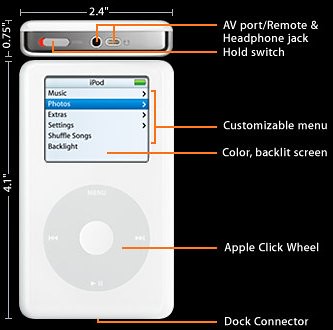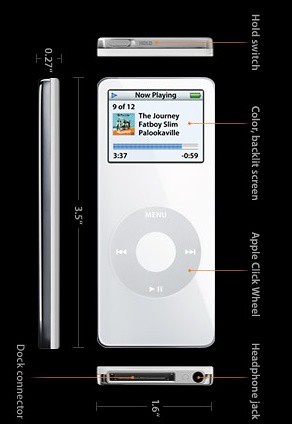About the iPod
By now, I presume nearly all readers have heard of the iPod. Here's a page at Apple illustrating the device.

This is essentially an MP3 storage device that stores up to 10,000 songs (assuming a Pop music format; I suppose for classical fans like me, that doesn't translate to 10,000 symphonies). The iPod was released in 2001 and made an impact partly through its immense popularity as a musical playback medium, partly through its popularization of MP3's as a medium for propagating music (in essence, allowing hobbyist-bands to enter the market with free samples of their songs; also, a revival of the political ballad, recorded to influence opinions rather than make money for the artist), and partly through its groundbreaking commercials.
However, the iPod was also more expensive than existing alternatives; while it also allowed one to carry one's entire music collection everywhere, it also required one to digitize that collection from an existing collection. Since then, the iPod's price has declined, and Apple has introduced a mini-iPod, the iPod Nano (Daniel's News Space).
Unlike the iPod and the iPod mini it replaces, the iPod Nano employs flash memory rather than the tiny hard disk drives developed as PC cards for laptops. The Nano will store only 1,000 songs, reflecting the discovery from practice that a thousand is the mode for users. I've been a little startled at the strong emphasis on reduced size; it seems to me that there will perhaps be joint efforts between Apple and digital camera producers to incorporate the iPod into cameras, or perhaps other PDA devices. At this point, I'd think it's handier to have a single device that does many things, than to have half a dozen gizmos, all quite small, with different features.
Besides, cross-marketing could get a lot of marginal users to become accustomed to using "the other half," i.e., if you get an iPod-Olympus digital camera, and you normally don't listen to music so much, having the iPod there all the time might get you habituated to using it.
Labels: PDAs



0 Comments:
Post a Comment
<< Home